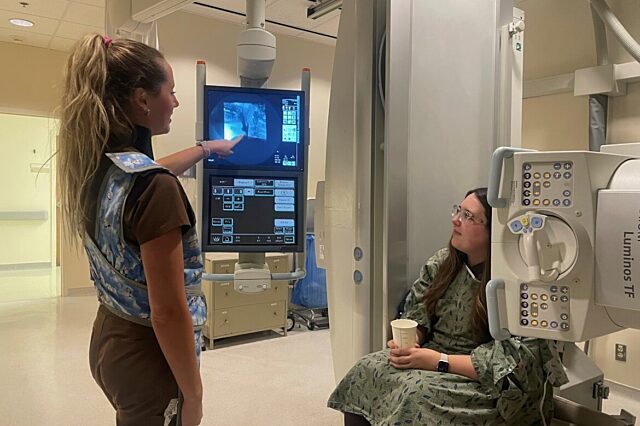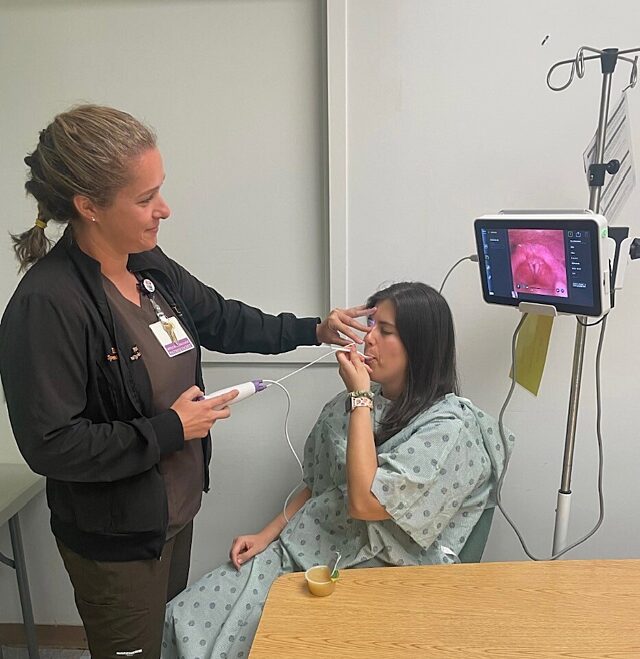Don't Let Dysphagia Leave You with a Lump in Your Throat
Speech-language pathologists, or SLPs, are experienced and qualified professionals who are trained to address swallowing difficulties.

Patients who experience difficulty swallowing, known as dysphagia, may have clinical challenges. Medication administration, discharge planning, nutrition optimization and overall patient satisfaction can all be greatly impacted by dysphagia.
Common symptoms of dysphagia
If you experience any of the following symptoms, you may benefit from dysphagia assessment and treatment:
- Coughing while eating or drinking
- Difficulty with swallowing
- Having a diagnosis associated with dysphagia, such as a neurological disorder
- Having the feeling of food or pills getting stuck in throat
- History of head and neck cancer
- Presence of a tracheostomy tube
Types of swallow studies
Speech-language pathologists perform swallow evaluations at the bedside, but sometimes the information gathered is insufficient to produce a treatment plan. Formal swallow studies are objective tests that allow SLPs to assess swallowing through visualizing the oral and pharyngeal structures.
The two types of swallow studies completed by SLPs are the videofluoroscopic swallow study (VFSS), also known as modified barium swallow studies, and the fiberoptic endoscopic evaluation of swallowing (FEES).
Videofluoroscopic swallow studies
Videofluoroscopic swallow studies are performed in the radiology department on an inpatient or outpatient basis. During a VFSS, the patient sits in a specialized chair, while the SLP assesses the patient’s swallowing abilities under X-ray with various consistencies of solids and liquids. A radiologist is present to manage the fluoroscopy machine and also assess the study.
This swallow study is often confused with a barium swallow study, also known as an esophagram. The VFSS is intended to assess for oral and/or pharyngeal swallowing impairments. If the patient is reporting symptoms such as GERD, ulcers, hernia, sternal discomfort, etc., an esophagram may be more appropriate.
Fiberoptic endoscopic evaluation of swallowing
Fiberoptic endoscopic evaluation of swallowing is an inpatient procedure performed at the patient’s bedside. The SLP uses a portable monitor and flexible endoscope to directly visualize the pharynx/throat. The small endoscope is passed through the nose into the pharynx.
During this study, the SLP achieves a bird’s eye view of the swallowing structures. The patient then eats and drinks various foods and drinks that have been dyed with food coloring to improve visualization. While the patient eats, the speech-language pathologist is able to assess swallow function and visualize any food/drinks that may be approaching the airway.
If you are experiencing difficulty with swallowing, the speech-language pathologists at UF Health Jacksonville are experienced with swallowing disorders and are an excellent asset in addressing dysphagia in both the inpatient and outpatient settings.
UF Health Jacksonville offers daily inpatient VFSS and FEES. Outpatient swallow studies are available at UF Health Rehabilitation – Jacksonville and UF Health Rehabilitation – North. Outpatient adult dysphagia therapy is currently available at UF Health Rehabilitation – Jacksonville, UF Health Rehabilitation – Emerson, and UF Health Rehabilitation – Wildlight.
For more information about rehabilitation services at UF Health Jacksonville visit UFHealthJax.org/rehab.
